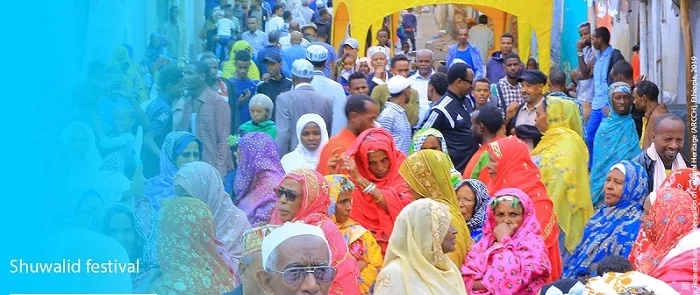Deep within the ancient walled city of Harar in eastern Ethiopia, a vibrant celebration unfolds each year. The Shuwalid festival, a three-day affair marking the end of Ramadan, pulsates with music, dance, prayers, and a deep sense of community. In December 2023, this unique cultural tradition received a prestigious recognition: The United Nations Educational, Scientific and Cultural Organization (UNESCO) inscribed Ethiopia’s Shuwalid festival on the Representative List of the Intangible Cultural Heritage of Humanity.
This inscription signifies more than just international recognition. It highlights the significance of the Shuwalid festival in preserving the cultural heritage of the Harari people, fostering social cohesion, and promoting cultural exchange. Let’s delve deeper into this remarkable festival, exploring its traditions, significance, and the impact of UNESCO’s inscription.

The Significance of the Shuwalid Festival
The Shuwalid festival unfolds over three days, following the Islamic celebration of Eid al-Fitr. It transcends mere merriment and serves as a cornerstone of Harari culture, playing a vital role in:
Cultural Transmission: The festival serves as a platform to transmit intangible cultural heritage to younger generations. Through participation in prayers, songs, dances, and attire choices, young Hararis learn about their traditions and connect with their roots.
Social Cohesion: The festival brings together the Harari community, strengthening social bonds and fostering a sense of shared identity. It’s a time for families and friends to reconnect, celebrate their heritage, and reaffirm their cultural values.
Cultural Exchange: The Shuwalid festival attracts visitors and media attention, providing a window into Harari culture for the outside world. This exchange fosters mutual understanding and appreciation between the Harari people and others.

UNESCO Inscription: A Beacon of Recognition
UNESCO’s decision to inscribe the Shuwalid festival on the Representative List of the Intangible Cultural Heritage of Humanity is a significant development for several reasons:
Increased Visibility: The inscription places the Shuwalid festival on the global stage, attracting more visitors interested in experiencing Harari culture firsthand. This can contribute to a boost in cultural tourism and local economic development.
Financial Support: UNESCO inscription can open doors for funding opportunities dedicated to safeguarding and promoting the festival. These funds can be used to support local artists, document traditions, and organize cultural events.
Sense of Pride: For the Harari people, UNESCO recognition is a source of immense pride. It acknowledges the value of their cultural heritage and places it on par with other respected traditions worldwide.

Safeguarding the Future of the Shuwalid Festival
The UNESCO inscription comes with a responsibility to ensure the continued practice and transmission of the Shuwalid festival. Here are some potential measures to safeguard its future:
Community Engagement: Encouraging active participation from younger generations is vital. Educational programs and workshops focused on Shuwalid traditions can ensure their continued relevance for future generations.
Documentation: Preserving the festival’s history and traditions through audio-visual recordings, photographs, and written accounts is crucial. This documentation can serve as a valuable resource for future research and education.
Sustainable Tourism: Developing a sustainable tourism model around the Shuwalid festival can provide economic benefits for the Harari community while ensuring respect for their cultural practices.
The Shuwalid festival is a vibrant tapestry woven from tradition, faith, and community spirit. UNESCO’s inscription acknowledges its significance not just for the Harari people but for humanity as a whole.

